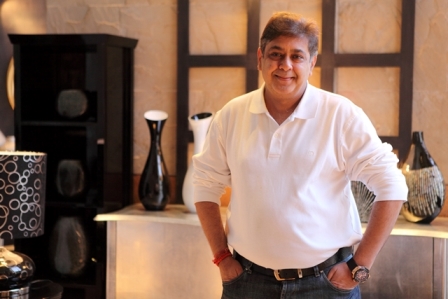Her first book sold 50,000 copies and her second one’s just out. Madhuri Banerjee talks about putting herself out there.
by Vrushali Lad | vrushali@themetrognome.in
Madhuri Banerjee wrote her first novel, Losing My Virginity And Other Dumb Ideas, on a whim. “I had just had my baby and a 30-something friend was visiting me. While talking, she mentioned that she was still a virgin. That made me think a bit,” Madhuri says. Surprised at this information, and wondering if there were other such virgins around, she spoke to a few of her friends. “There were about three other women who said they were still virgins. “I wondered: what does a woman have to do to lose her virginity?”
And so Madhuri sat down in September 2008 and began to write. “I wrote one punchy chapter, then I showed it to my best friend, asking if she would like to read more. She said she was interested in reading further. I also showed it to my husband, who raised his eyebrows and said, ‘Chick lit?’” she laughs. “But when I said I was serious about writing this, he said, ‘Be the next Elizabeth Gilbert.’”
Since her baby was just three months old and her husband worked full-time, Madhuri could write only at night. “The story was already in my head, and I didn’t edit it as I wrote. I finally finished it in January 2009. Then I wondered how to send the book to publishers.”
Sending the manuscript: Her husband’s friend had been published by Penguin. “I sent my manuscript to that contact that the friend gave, and like an idiot, I sent the entire book at once, instead of just a synopsis and a sample chapter,” she grins. “I also enclosed a cover letter saying that I was a debut writer hoping to be a debut author. But I did not know that the woman I had sent out the book to was the Penguin CEO’s wife! And she got back to me in 48 hours!”
The publishers’ first feedback: “Heather, who I had sent the book to, said she loved it and that she would ask the relevant editor to contact me and that they would send me the contract. She ended by welcoming me to the Penguin family. I had goosebumps all over my body, and I stammered my thanks, hardly believing what I was hearing,” she says. The editor called a week later and things got underway. “I had also sent my book to Harper Collins, but I didn’t hear back from them and honestly, I didn’t care. My first book was about relationships and for me, relationships are far more important than business.”
The production process: “Penguin is extremely thorough with the editing process. My editor had skimmed through the book on her first read, then she read it thoroughly on her second read. The book then went through structural changes, grammatical errors were removed, there were some name changes as well. Yet another editor read sections of it, 30 pages at a time, and she was extremely thorough. She suggested several language changes, and she and I had several arguments about them. I accused her of having Jane Austen sensibilities, not letting me use words like ‘Ain’t,’, and she retorted that she was only trying to make it better!” Madhuri laughs. “But she really made me understand the editing process well.”
The jacket: Normally, Madhuri says, the publishers show you a jacket option “that they try to convince you is the best option.” Her book’s first cover had a picture of a balloon “with three things coming out of it. Given a choice, I would have loved a picture of water droplets and a rainbow and a girl standing at a window.” She adds, “It was very exciting. We sold 20,000 copies with that first cover. The second cover was very successful, everybody loved it. Usually, if the book falls in a particular category, like mine did (it was published by Penguin Metro Reads), the jacket design follows a set format.”
The launch: The book was launched at Penguin’s Spring Fest in March 2011, and had a Mumbai launch later, in which actor Gul Panag was the chief guest. “Gul said she’d be there only for a short while, then she spent three hours at the launch. It was great,” Madhuri says.
Sales: “The book has sold over 50,000 copies so far,” Madhuri says. “It is still selling, and I’m shocked that people are still reading it.” But what about the royalty factor, and is it true that first-time authors are paid a pittance as advance fees? “Yes, you make peanuts as a debut author. But you know, I spoke with Ashok Banker, and he said that he was paid very little by publishers for a long time before he was signed on with an eight-figure advance. It’s best to leave all that to the publishers, and write for yourself with all your heart.”
Authors can also make more money through translations of their work in other languages, like Madhuri is doing – her first book has now been translated in three Indian languages, and has been selected for an e-book version for Kindle.
Multiple book deals: Since the novel was a big success – in the Indian publishing scene, anything selling about 5,000 copies is considered a good break – Penguin handed Madhuri a two-book deal. This prompted a big rethink, because she hadn’t considered writing a sequel. “The publishers give you a deadline in which to finish each book, and mine was March 2012. The sequel was more difficult, because your characters had to have evolved, there had to be a whole new dimension to them and the plot. Plus, the scenes, the dialogues had to be more mature. I put more of myself in this book than the first,” she reveals.
Cruel feedback: How does she deal with criticism? “Very badly,” she giggles. “When I received the first emails really trashing my book, I cried for days. It still takes me an entire day to recover from nasty feedback. People really were cruel, some of them said the book was terrible, it should never have been printed, my writing was pathetic. I find it tough to deal with it, because I am passionate about every sentence I write. Every word I put down is me. And I don’t criticise another person’s creativity at all. Now I’ve taught myself not to imbibe the negativity. I rest peacefully, meditate and find a balance.”
Madhuri’s tips for aspiring authors:
– Know your work thoroughly. Go through it with a fine tooth comb, and be confident about your story. More importantly, live with it for some time.
– Be patient. Publishers have a huge workload and they may take time to evaluate your work. Be patient whether you receive an acceptance letter or a rejection email. If your work has been rejected, reevaluate it, rework it, give it a different title, send it out again.
– Be shameless about networking. Use your friends, their contacts, whoever you think will get you that foot in the door. Buy them a lavish dinner if you have to, just go out there and network.





This website can be a stroll-via for all of the info you wished about this and didn’t know who to ask. Glimpse here, and you’ll positively discover it.